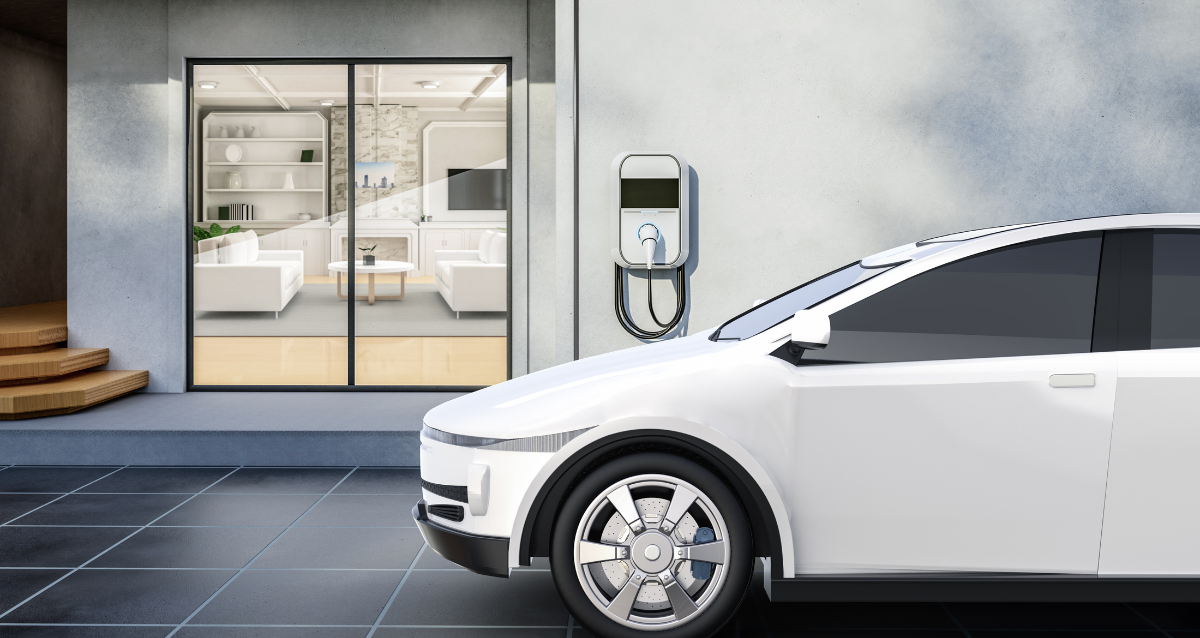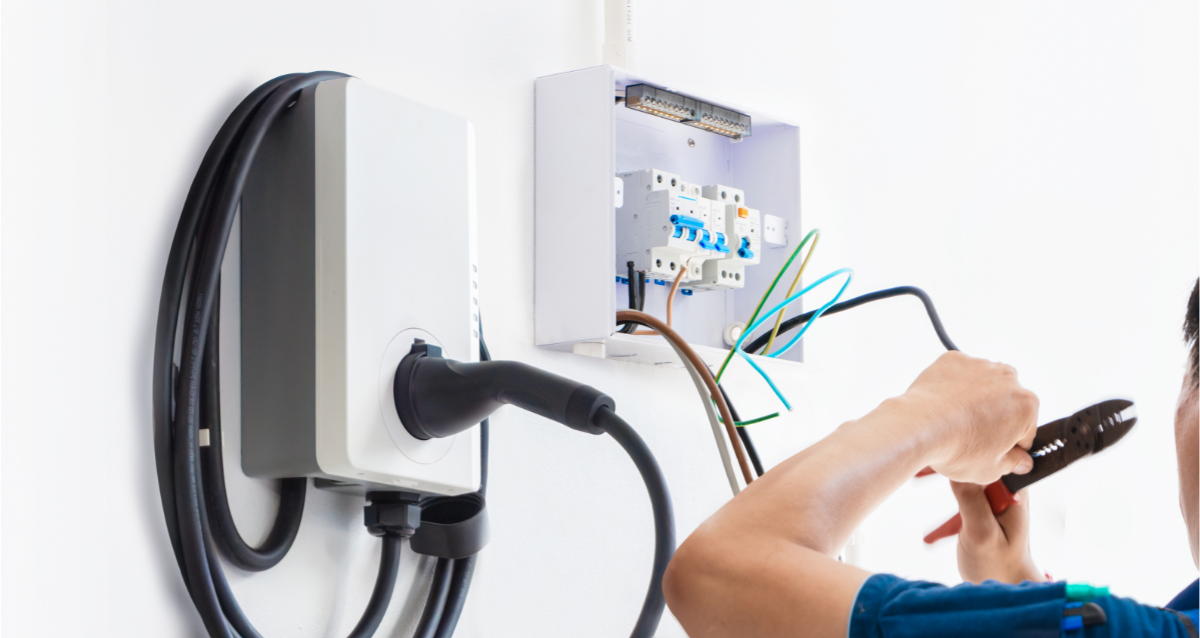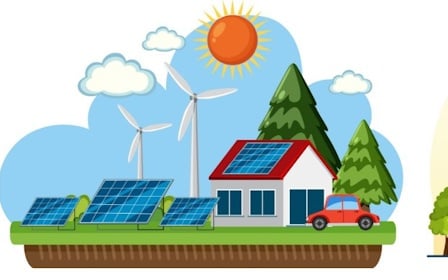EV public chargers aren’t as commonplace as gas stations, but that’s quickly changing. There are more than 61,000 public EV charging stations in the United States and about 64% of Americans live within two miles of one of these stations.
Even so, often the most convenient way to charge your electronic vehicle is to do so at home because it takes far longer to charge an EV to full than it does to fill a car’s gas tank.
What are the Basic Requirements for Installing an EV Charger in a Garage?
Most EV charging cords are 5 meters in length. If you own one electronic vehicle, you’ll want to install the charging station near the vehicle’s charge port for easy access. If you have a 2-bay garage with two EVs, install the charge station between the two vehicles.
According to the California Energy Commission, the charger should be between 42 and 48 inches high, about three to four feet from the outlet, and 1.5 feet off the garage floor. It should also be able to connect with your home’s Wi-Fi network for constant monitoring.
It's important to keep the area around your charger clutter-free. If you have a lot of items stored in the garage, you may need to reorganize the area and/or build storage shelves away from your charger. Doing so will reduce fire hazards and allow you to charge your vehicle with ease.
 What Types of EV Chargers are Available for Home Use?
What Types of EV Chargers are Available for Home Use?
There are Level 1, Level 2, and Level 3 EV chargers. However, only Level 1 and Level 2 chargers are available for home use.
Level 1 chargers are easier and cheaper to install than Level 2 chargers. However, charging speed varies among chargers. If you own a hybrid vehicle, don’t drive your EV very much, and don’t mind using public EV charging stations from time to time, a Level 1 charger may be all you need.
These chargers can also work well for you if your workplace has a free EV charging station for employees. However, you’ll likely find that purchasing a Level 2 charger may be your best bet if you use your EV regularly and/or have more than one EV owner in your household.
Level 2 chargers take between 2 to 13 hours to charge an electric vehicle. They can be expensive to install as you’ll need 240V wiring in your garage before putting in the charging station, but traditionally older homes and garages have 120-volt wiring. And no, you unfortunately can’t piggyback off your 240V dryer wiring, because an EV charger will need its own dedicated circuit.
Even so, these chargers may save you a lot of time in the long run and would therefore be worth the expense. What’s more, a good EV charger in the garage can boost your home’s value if you live in an urban area where electronic vehicles are becoming increasingly popular.
 How Does the Electrical System in a Home Affect EV Charger Installation?
How Does the Electrical System in a Home Affect EV Charger Installation?
A Level 1 charger only needs a 120V connection. This means that, in many cases, you can simply plug the charger into a standard 110-120V outlet and start using it. However, you may need to make some significant changes to your garage’s electric system if you’re installing a Level 2 charger.
A Level 2 charger will need a dedicated 240V circuit. However, you’ll first need to consult an electrician to determine if your home can handle such a circuit. Some homes can, but houses with large appliances such as a hot tub or tankless water heater may not have the extra power capacity. If the house doesn’t have sufficient power supply, you’ll need to have a new service line run into the home.
What are the Costs Associated with Installing an EV Charger in a Garage?
There aren’t many costs associated with installing a Level 1 EV charger in your garage. You simply have to purchase the charger, plug it in, and use it. However, there are many costs associated with installing a Level 2 EV charger.
First, you’ll need to shell out money for a permit and then pay for an inspector to check the work once it’s done. If your home needs a new service line, you’ll need to pay for that, too. Furthermore, like all work with high-voltage systems, all the electrical work done in your garage must be done by a professional electrician.
Attempting to install a Level 2 EV charger on your own is extremely dangerous and can cause a serious accident and/or void your home insurance policy.
Are There Any Permits or Regulations that Homeowners Need to be Aware of Before Installation?
According the National Electric Code, you’ll want to get a permit to install a Level 2 EV charger in your home. However, you can’t pull one on your own. Only the licensed electrician you hire for the job can apply for one for your home. The permit approval process can take anywhere from a few days to a few weeks, depending on your geographic location.
Cost for a permit also varies depending on your location. Once installation is complete, you’ll need to notify the permit office. The office will then send an inspector to verify that the charger was installed in accordance with local regulations.
It’s also important to notify your home insurance company about your new EV charger installation. Be sure to update your insurance agency in case your coverage will provide compensation in the event of an unfortunate incident.
Additionally, you may need to purchase additional liability coverage if you allow people who don’t live in your home (i.e. neighbors, co-workers, adult children and relatives visiting for the holidays, etc.) to use your EV charger.
What are the Benefits of Having an EV Charger in Your Garage Compared to Using Public Charging Stations?
One of the main benefits of having an EV charger in the garage is that it may save you a lot of time and hassle. This is true even if you have one or more EV charging stations close to your home.
What’s more, installing an EV charger at home can lower your charging costs if you pick the right time to charge your vehicle. Many power companies have time-varying rates, which means you’ll pay less for electricity during low-demand hours (i.e. the middle of the night) than you would during peak hours. You can use an app connected to your charger to schedule your vehicle to charge at the most affordable times.
Another benefit of having an at-home EV charger is that it can prolong the lifespan of your vehicle’s battery. Public chargers are designed for speed and can’t be configured to deliver the charge recommended by your vehicle’s manufacturer.
If the charge on a public charger is not the charge recommended by your manufacturer, it can put a strain on your EV and can cause battery problems. With an at-home EV charger, you can set the charge to any manufacturer’s specifications. You can also change these specifications as needed if you purchase a new EV model, own more than one EV, or allow others to use your charging station.
Do New Construction Homes Come with EV Chargers or EV Charger Pre-Wiring?
Atlanta, Denver, Palo Alto and other municipalities in the United States have requirements in place mandating that contractors building new single-family and multi-family homes must add infrastructure to support EV charging. Those who buy these homes would still need to purchase their own charger but they won’t have to pay the high cost of having the homes rewired for a 240V outlet.
Additionally, many construction companies in states with a high percentage of EV owners are adding EV wiring to newly built homes in order to increase the home’s appeal and sale price. If you buy a newly constructed house in a large city in California, Texas, or Colorado, you may be pleasantly surprised to find that EV wiring is already in place in the garage to allow for easy EV charger installation.
Furthermore, as EV vehicles become increasingly common, in-built wiring will likely become even more commonplace. The International Code Council approved a new building standard provision in 2022 that would make all newly constructed homes in the United States “EV-ready”.
Installing an EV charger in the garage takes time and hard work. Additionally, it can cost a fair bit of money. However, it’s an investment that will pay off long-term. Electronic vehicles are projected to continue to become a much bigger part of the vehicle market. They’re more affordable to charge than gas-powered vehicles. and they don't emit carbon dioxide which is bad for the environment, unlike gasoline-powered vehicles."
EV technology advances will likely make it possible for these vehicles to become increasingly affordable and efficient. If you own an EV or are thinking of buying one, consider the EV charger information outlined above to determine the best way to install a personal charger to keep your vehicle powered up at all times.


